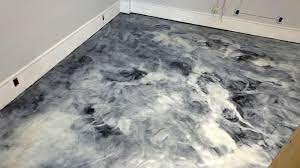In the world of flooring solutions, epoxy concrete floor coverings have emerged as a trendsetter, combining durability, aesthetics, and functionality. As industries and homeowners alike seek versatile and long-lasting flooring options, epoxy coatings have gained immense popularity. This comprehensive guide explores the various aspects of epoxy concrete floor coverings, from their composition and installation to the myriad benefits they offer.
Understanding Epoxy Concrete Floor Coverings:
Epoxy is a thermosetting polymer that is widely used in various applications, and one of its prominent uses is as a flooring material. Epoxy concrete floor coverings are created by applying multiple layers of epoxy resin onto a prepared concrete surface. This process results in a seamless and durable finish that enhances the overall appearance of the floor.
Composition and Types of Epoxy Coatings:
Epoxy coatings are composed of two main components – epoxy resin and a hardening agent. When these components are mixed, a chemical reaction occurs, forming a rigid and durable surface. There are different types of epoxy coatings available, each designed to meet specific requirements:
- Solid Epoxy Coatings:
- Known for their thickness and durability, solid epoxy coatings provide a robust protective layer to the concrete floor. They are ideal for industrial and commercial spaces with high traffic and heavy machinery.
- Water-Based Epoxy Coatings:
- Environmentally friendly and easy to apply, water-based epoxy coatings are often used in residential settings. They emit fewer odors and are considered a more sustainable option.
- Self-Leveling Epoxy Coatings:
- This type of epoxy is designed to create a smooth, level surface. It’s commonly used in areas where a flat and even floor is crucial, such as laboratories and manufacturing facilities.
- Decorative Epoxy Coatings:
- For those seeking an aesthetically pleasing finish, decorative epoxy coatings offer a wide range of colors, patterns, and textures. These coatings can transform a mundane concrete floor into a visually stunning masterpiece.
Installation Process:
Installing epoxy concrete floor coverings requires precision and expertise. Here is a step-by-step guide to the installation process:
- Surface Preparation:
- The key to a successful epoxy flooring installation is proper surface preparation. This involves cleaning the concrete surface thoroughly and repairing any cracks or imperfections.
- Priming:
- A primer is applied to the prepared surface to ensure better adhesion of the epoxy coating. This step is crucial for the longevity and effectiveness of the flooring system.
- Epoxy Application:
- The epoxy resin and hardening agent are mixed and applied to the primed surface. Depending on the type of epoxy coating, multiple layers may be added to achieve the desired thickness.
- Curing:
- After the epoxy is applied, it undergoes a curing process, during which it hardens and forms a durable bond with the concrete substrate. Curing times can vary, and factors such as temperature and humidity play a role in this phase.
Benefits of Epoxy Concrete Floor Coverings:
- Durability:
- Epoxy coatings create a resilient surface that can withstand heavy traffic, impact, and abrasion. This makes them an excellent choice for industrial and commercial spaces where durability is paramount.
- Easy Maintenance:
- Epoxy floors are easy to clean and maintain. The seamless surface prevents dust and debris from accumulating in cracks and crevices, simplifying the cleaning process.
- Chemical Resistance:
- Epoxy coatings are highly resistant to chemicals, including oils, acids, and solvents. This feature makes them suitable for use in laboratories, garages, and manufacturing facilities where exposure to various chemicals is common.
- Aesthetic Appeal:
- The availability of a wide range of colors and patterns allows for customization, giving homeowners and businesses the opportunity to create visually appealing and unique floors.
- Hygiene and Safety:
- The seamless nature of epoxy floors minimizes the growth of bacteria and mold, promoting a hygienic environment. Additionally, certain epoxy coatings can incorporate anti-slip additives, enhancing safety in high-traffic areas.
Applications of Epoxy Concrete Floor Coverings:
- Garage Flooring:
- Epoxy coatings are a popular choice for garage floors due to their durability, easy maintenance, and resistance to chemicals and automotive fluids.
- Industrial Facilities:
- In industrial settings where heavy machinery and equipment are used, epoxy floors provide a robust and resilient surface that can withstand the demands of the environment.
- Commercial Spaces:
- Retail outlets, restaurants, and offices benefit from the aesthetic appeal and durability of epoxy floor coverings. Decorative epoxy coatings can be used to create unique and inviting spaces.
- Residential Homes:
- Epoxy floors are making their way into residential spaces, particularly in kitchens, living rooms, and basements. The customization options allow homeowners to match the flooring to their interior design preferences.
Conclusion:
Epoxy flooring for garage have revolutionized the flooring industry by offering a combination of durability, aesthetics, and functionality. From industrial facilities to residential homes, the versatility of epoxy coatings makes them a preferred choice for a wide range of applications. As technology and design innovations continue to emerge, it’s likely that epoxy flooring will remain at the forefront of modern flooring solutions, providing a seamless and stylish foundation for various spaces.


